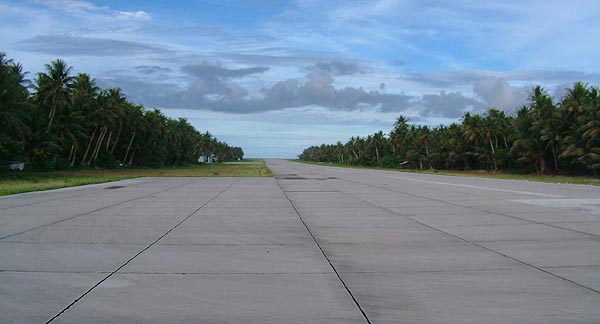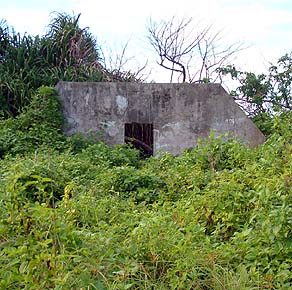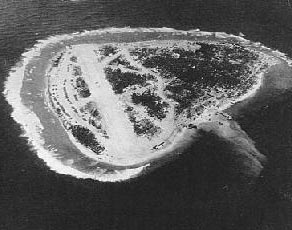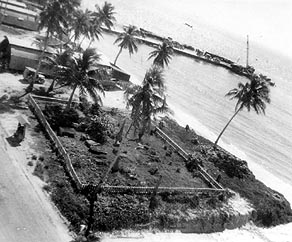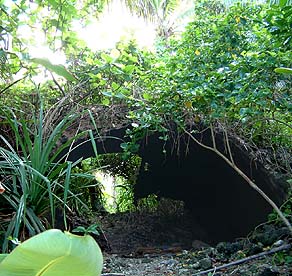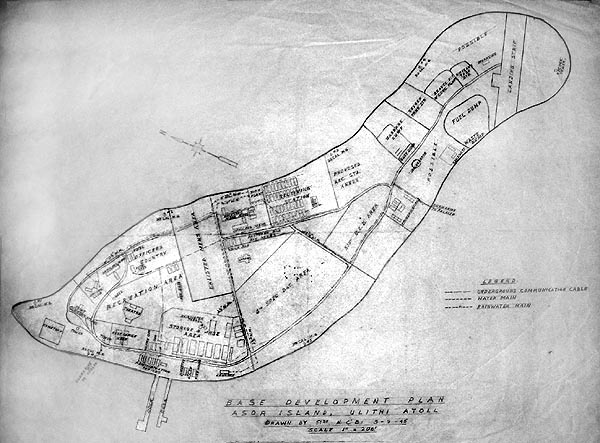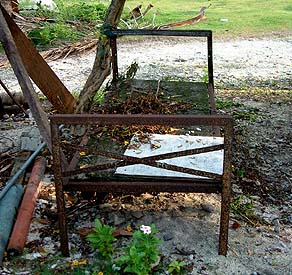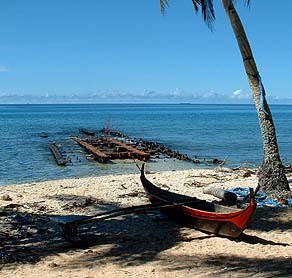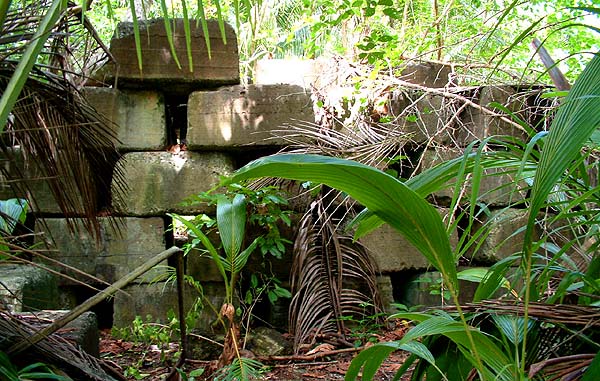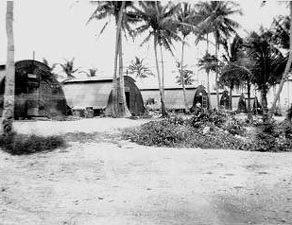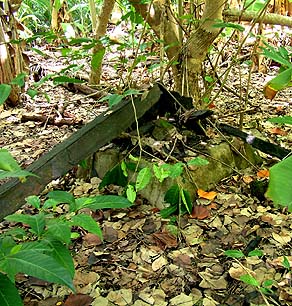 |
 |
 |
|||||
|
|
|
|
|
|
|
|
|
|
|
|||||||
| |
|
|
|
“Before I left Falalop, there was no airport on this island,” Manuel says, “so when I came back and looked around. ‘Oh?, How come my island is divided into two parts?’ We were feeling, we knew all of this island but it looked different from before. Only a few coconut trees, only a few banana trees were left over. This is 1947. The Americans had moved. And they just said ‘here you are'."
|
||
|
|
||
“The men here during the war,” Mariana Chim recalls, “they say that, during the air raids they were not frightened until one day a Navy placed all the islanders on that Fedraey island so the military could work freely without the islanders interfering. And then, when those men came back to this island, those same men who had not been afraid during the air raids, they found the runway to be in place in their precious taro patch. They got frightened. "Probably, they all depended on that for food. And they found this huge taro patch to be filled in with debris so that the runway could be set there. Then they got scared. And a dance was made after that, that tells how they got frightened, how they got scared when the Americans erased that taro area that they depended on. It is still danced today.”
|
|
|
“See, this place was all boonies,” Chief Yatch points around Falalop. “After we came back, they had cleaned up everything. Even a cigarette butt you could not find on the ground. Very clean. And you could stand here, look around, and see the horizons. There were several trees, but under them, no bushes or all those things. Everywhere was roads. I heard that they stationed ten thousand people on this island in Quonset huts and tents. Lots of them—lots and lots and lots.” “I couldn’t really picture Mogmog before we went down to Fedraey,” Hosay remarks. “But when I came back up, there was a road around the outside of the island. You could just look out from here and see who’s walking on that side, it was so clear. Only a few trees remained here on the island. Because they cleaned up everything."
|
"Luckily, they put a fence around our cemetery. They didn’t bother our cemetery. Maybe they just saw the rocks and they knew that this is our cemeteries. So they put fence around all the cemeteries that they found here on the island to protect them. “All these places were occupied by the Navy. There were some houses that they didn’t break down. And all over the island were these Quonset huts. There were two big ones here in the middle of Mogmog. Later we used one of those Quonsets for our church, and we used the second one for our school.”
|
|
|
|
|
|
“The Americans left little by little,” Alphonso remarks, “while some of them stayed back destroying all of those things. There was a lot of equipment. VPs, M-boats, even ships. Some of the ships they had to sink them, outside of the reef. According to what I heard, they said it was cheaper to sink them than to take them back to the U. S. Also, many boats were pulled up on the beach and set on fire. They burned them. If you go to Asor you can still see some remnant of those M-boats, still on the reef.”
|
||
|
|
||
| “After the war, they just bulldozed everything—I mean everything—off the end of the runway,” Mariano emphasizes: “trucks, remnants of trucks, pieces of machinery, airplanes, they just pushed them over. And the waves washed them away. When I was young. I used to go out there and sit on the wings of airplanes, in the water, and we fished with fishing poles. But now you cannot find any airplanes sitting there, they were wiped away. “And all the workable airplanes,” Chief Yatch adds, “they just dumped them in the ocean. We have a dock out there, extending out there. They took all the airplanes down, and a bulldozer pushed them out. They are all in the ocean, including all kinds of vehicles. Just dropped in there.”
|
|
|
“There’s still some debris there,” Mariano continues, “but compared to the whole pile of debris before that I can still recall, today I should say, ‘it’s cleared up.’ I mean, that’s how big a difference it is. “There was an American oiler that was sunk by the Japanese. But the rest of the ships that were here, these were sunk by the Americans. It would take so much time and energy to haul that back to the States. The divers who have been down there say that almost everything was still intact, even kitchen utensils.” “The Americans used Asor as a headquarters,” Flomina Yetang points out. “Now there are concrete slabs, we have here, all over this island, concrete slabs left over from the war. But when the Navy left, they left Quonset Huts. And warehouses full of beds and full of almost everything. Their freezers, ice boxes. But no electricity. They just left those things."
|
| |
|
|
“The people here, they start looting!" Flomina and Pedrus laugh. "They started putting things away and what else. Life was a luxury: we came back to all these building, housing and all that food, just piled there waiting, pork, corned beef, peanut butter, and all kinds of canned meat. You just go, ‘Ah, this is what I want.’ Take out, eat a little bit, you’re not used to it, you throw away the rest. Especially corn, beans, we were not used to this. The taste was different. We got rid of that, but we went for the meat.
|
||
|
|
||
|
“One of the warehouses was filled with mattresses and bed frames all the way to the ceiling. We used them—some used them wisely and some did not. They’d take them, put them under coconut trees, and they just left them there. "Some took the mattresses to the water, used them as floats, and put under the coconut trees; and some took the bed frames, put them in the water, put the mattresses on and used them until the high tide came in and they got really soaked. They just left those down there. "But those wise ones, they kept them, they took care of that stuff.”
|
“But before the Navy left, the chief or the king who lives in Mogmog asked them to destroy most of the stuff. So they burned a lot, and they buried a lot. So most of the houses you will go to you will see those Navy remnants, and so whatever the islanders could grab, they grabbed and put away. “Then people from Public Works in Yap came, and then also a group from Hong Kong came, and took some equipment away. But when the people here heard that they were coming, they dug holes and put inside like tin roofing and tools, and whatever they could find, they stored them in there and concealed it. “But these people were just interested in the heavy equipment. They didn’t know that these people here don’t know how to use those cranes—and they also had left jeeps. Those young men were going around in jeeps, first gear only or what. “
|
|
|
“At that time, we were still sort of afraid, and also we listened to our chief, our former chief from Mogmog, because he was the one who negotiated with the Americans. We were lucky in that, the former chiefs that we had, they didn’t allow anyone to use any of those this kinds of boat that they had, or any vehicles. There were a lot of vehicles left behind. "And a lot of fuel. The people used the fuel for lamps, they’d make ‘oilers’: they put wick through something and put gasoline or kerosene or whatever, and that’s what we used for lamps at that time, because all the electricity was shut down. “But the chief, he says ‘no,’—not even a store. He didn’t want anyone to bring in a store to Ulithi. Until later on some people, especially from Mogmog, some elders, they went ahead and started their own stores in Mogmog, and then that’s when the other islands start putting up stores."
|
|
|
|
|
“When we reached the islands, especially Falalop and Asor, the Quonset huts were there. Beds were there, mats, coffee, everything. Some people just got in, got up on the bed and in the morning they started cooking and drinking coffee and all those things. Go, go, go, go, until a couple of years later it begin to deteriorate. The mats got dirty and there was no way to clean them. All those sheets were used for dead bodies, because that’s what we usually do.
|
||
|
|
||
“And finally people went down on the floor—no more beds, and no more coffee. So we started eating our own food. We asked Yap for some food at the time, because the island, the topsoil was scraped off. It was thin, almost like paper, so it was hard to grow things at the time. But that’s when we started planting again, and so I think only two or three times that food, potatoes, were sent to us from Yap. "And finally, people started breaking down the Quonset huts and building their own houses. There were forty Quonset Huts, for military barracks, lined up on Asor Island, and all these things were broken down and used for our own houses. “First roofing tin roof, then finally when the tin roofs failed, there was still no place to buy a tin roof, and no money, so when the tin roofs were worn out, we start using thatched roofs."
|
|
|
"Also, there was this Japanese watchtower and there was a wooden house on top. They’d stay there and watch. I knew about this because I was one of those who went up there. And we dismantled it and took it to Mogmog and built a house with it. "And finally, all those military houses were all taken apart and each person used the materials for his own house, and built it where he had to build and so on. “So, what I respect the old chief for is that, what if he didn’t stop us, and we came to depend on what the military had left behind, and suddenly, that runs out—then where are we? So we were lucky that we didn’t adopt the use of all those things. Instead, we started making canoes."
|
|
|
|
| "Eventually we had a way of earning some money and we’d buy boats and those things. I guess we have just followed the changes. But at that time, when I think what the old chief said, if we had used all these boats and then the fuel ran out and the engines broke down, and we had forgotten how to sail our own canoes, then where are we? When I think about it, I say, thanks to the old chief who saw this in his mind.” “I couldn’t tell you how long it lasted,” Flomina says, “but after that luxury life, we returned to almost normal. We still kept on doing the old ways.”
|
||
|
|
||
|
|
|
|
|
|

|
| Ulithi Home | Map Library | Site Map | Pacific Worlds Home |
|
|
|
|

|
|
|
||
|
Copyright 2003 Pacific Worlds & Associates • Usage Policy • Webmaster |
